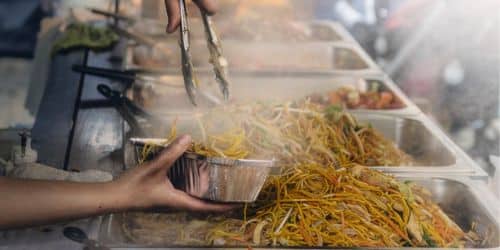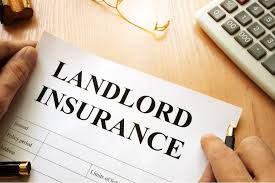A policy, or set of policies, is what food vendors require to safeguard their companies from the financial damage that could result from a claim. The most popular policy, is general liability, with an average annual cost of between $350 and $1,000 and a coverage limit of $1 million per event and $2 million aggregate. Concession stands, food carts, coffee carts, and even food trucks fall under the umbrella category of “food vendors,” and the Food Liability Insurance Program (FLIP) provides particular coverage for each of these businesses. In just a few minutes, FLIP can provide you with an estimate and help you get insurance. This article will discuss the cost of mobile food vendor insurance for festivals.
What is Food Vendor Insurance?
A collection of insurance plans known as food vendor insurance is necessary to run a food company, like a food truck or concession stand. These are the most typical insurance coverage needs for food sellers, while different types of food vendors may have different needs.
#1. General Liability Insurance
Legal costs and medical expenses associated with allegations that your company is to blame for inflicting property damage, personal injury, or advertising injury are covered by general liability insurance. Product liability insurance, which defends against lawsuits involving food poisoning, is frequently included in general liability insurance. Event planners frequently want general liability insurance from food suppliers.
#2. Commercial Property Insurance
You will require commercial property insurance if you own business properties or if you have expensive equipment installed in rented space. This covers the cost of repairing or replacing your equipment or property after a covered loss, such as vandalism or a cooking fire. Commercial property insurance normally does not cover earthquakes and flooding; therefore, some business owners may decide to get separate coverage for these risks.
#3. Business Owner’s Policy
A business owner’s policy (BOP), often known as a general liability and commercial property policy, is a practical option for some food providers. Business interruption insurance, which assists in replacing net revenue if your company must shut down due to a covered loss, is frequently included in these plans.
#4. Inland Marine Insurance
Equipment that remains in your place of business may be covered by a commercial property or company owner’s policy, but it won’t cover items you carry to events. Computers, kitchenware, and other items that need to be repaired or replaced while being transported can be covered by inland maritime insurance.
#5. Workers’ Compensation Insurance
An employee’s medical expenses and missed pay are covered by workers’ compensation insurance if they are hurt or ill while doing their job obligations. In most states, if you have a specific number of employees, you must have this kind of coverage.
#6. Liquor Liability Insurance
After a lawsuit results from your company’s sale of alcoholic beverages, liquor liability insurance pays for repairs, court costs, and medical expenses. For instance, the party that was hurt by your business could sue you if you served alcohol to someone who later assaulted someone else, damaged property, or was involved in a drunk driving accident. For food vendors that sell or distribute alcohol, liquor liability insurance is a need.
#7. Commercial Vehicle
You will want commercial auto insurance if you run a food truck, travel to clients for your catering business, or use vehicles in any other way for business purposes. The same protections, like liability insurance, physical damage coverage, medical payments, and uninsured motorist coverage, that are generally included with a personal auto policy are also included. You can buy hired and non-owned auto insurance if you don’t own the vehicles you use for your business.
#8. Cyber Insurance
Businesses that keep client data will need cyber liability insurance, which helps pay to restore your company’s reputation, lost or corrupted data, or lost business income following a cyber attack. This insurance covers several liabilities. Cyber insurance will shield you from lawsuits brought about as a result of clients’ financial losses, for instance, if you keep credit card information for your catering clients and your firm experiences a breach.
Who Needs Mobile Food Vendor Liability Insurance
Any company that sells food in unconventional places should think about insurance. This includes food vendors, public walkways, street fairs, and outdoor venues. Small companies that typically require food vendor liability insurance include:
- Food carts
- Mobile kitchens
- Food trucks
- Caterers
- Concessionaires
- Personal and private chefs
- Restaurants at an event
Vendor insurance is necessary for most events, even one-day events. Each venue may desire to be named as an additional insured on the certificate of insurance (COI), and each has its own specifications. If you’re taking part in an event, find out what kind of insurance the venue needs because your usual policy might not include off-premises coverage, especially if you own a brick-and-mortar restaurant.
Food Vendor Insurance for Festivals
Festivals food vendor insurance policy is made to respond to claims relating to the regular operations of your company and to offer a financial safety net for your assets. Accidental falls, sickness brought on by your food product, and lost equipment are all examples of covered claims. Our policy provides protection against damage to rental property, general liability, product liability, and business personal property/inland marine.
How Much Does Festivals Food Vendor Insurance Cost?
For food vendors, liability insurance costs as little as $25.92 per month, or $299 annually. However, the sort of coverage needed by a business will vary. Your policy’s cost may change if you customize it. The cause may change depending on a few other circumstances. These elements comprise:
- Your choice of insurance limits
- Gross business profits for your company
- the scope of your coverage
Do Festivals Food Vendors Need Liability Insurance?
Yes. It might be dangerous to work as a food vendor during a festival. A business’s liability claims could cost tens of thousands of dollars or more. Food vendor insurance for festivals is vital to safeguarding your company because it can lower or even eliminate the cost of liability claims.
A+ rated general and product liability insurance up to $2 million, as well as $10k in tools and equipment insurance, are available to protect your food vendor business. The Food Liability Insurance Program (FLIP) offers higher limits and more flexible coverage options for companies that need them.
Who Requires Food Vendor Insurance for Festivals?
You must get festival food vendor insurance if you sell food at events like music festivals, visual arts festivals, Renaissance festivals, film festivals, and others. There are hazards involved with serving your food, and vendor insurance for food festivals can shield your company from the high expenses of claims.
A customer having an allergic reaction to the food they bought from you or a customer getting hurt at your station are just two examples of the various third-party claims you can encounter. It may result in legal action in some extreme circumstances, and defense costs can quickly mount. Many small business owners may suffer from this kind of financial stress. Food vendor insurance Festivals serve as a safety net for your finances and are made to address any claims from insured third parties you may encounter.
One-Day Food Vendor Insurance
The event planners may request proof of insurance from food vendors who offer catering services. They should be fine if they currently have normal long-term insurance coverage. They might need to get a one-day food vendor insurance policy, though, if they don’t already have basic insurance coverage. This policy would have a $1 million coverage limit and would cover general liability and product liability.
What is One-day Food Vendor Insurance?
This type of insurance coverage provides vendors with defense for a brief period (typically a few hours or days). One-time event insurance is another name for coverage. Even all of the coverages offered by an insurance plan for an ongoing event, including general liability insurance, liquor liability insurance, and rental premises liability insurance, may be included in a typical one-day food vendor insurance policy.
Additionally, several insurers include inland marine protection in their insurance for one-day food vendors. If the items you want to sell at a vending event are lost or damaged while in transportation, the costs incurred will be covered by goods in transit insurance.
Vendor Liability Insurance
If you work as a vendor, you are aware that you must carry vendor liability insurance in order to attend an event. The vendor is protected by vendor liability insurance in the event that a third party sues the vendor on the grounds that the vendor’s goods, services, or business practices injured the third party. This type of insurance can help the vendor avoid the financial losses brought on by a legal claim.
How Much Does One-day Food Vendor Insurance Cost?
A $1 million general liability insurance policy that covers only one day typically costs $28. It could appear cheap. It might not seem as inexpensive, though, if you can buy the same policy for the entire month for just $29 instead. Although one-day vendor coverage can be less expensive, you might be better off purchasing a standard policy and paying for the first month.
Given that every event is different, the cost of one-day vendor liability insurance may differ from service provider to service provider. Depending on the type of event, the number of attendees, and the risks involved, the cost could differ.
Food Vendor Insurance Cost
The cost of food vendor insurance varies according to the types of coverage you select, the coverage limits you choose, and the size, location, and number of employees of your business. While company owner’s plans, which include property coverage, normally start at $300 to $500 per year and can reach considerably higher depending on your needs, the lowest general liability policy we could locate was $299 per year through FLIP. Typically, the annual cost of commercial auto insurance for a typical business vehicle ranges from $600 to $2,400. Additionally, according to Next, the annual cost of workers’ compensation insurance might be as low as $146.
Remember that you can combine your insurance policies with some firms to receive discounts. Choosing a firm that provides all the coverage your business requires typically makes the most sense for this reason.
Best Food Vendor Insurance Companies
#1. Best for Cheap Package Coverage: FLIP
FLIP offers affordable general liability insurance that covers tools and equipment as well as some limited property damage for rented properties for food vendors without their own physical location. You can purchase it for specific occasions or add liquor liability for as little as $299 a year. Additionally, adding event planners as additional insureds is completely free. FLIP does not, however, provide coverage for common commercial property or commercial auto.
#2. Best for Flexible Coverage: Thimble
It’s simple to gain coverage quickly with Thimble. You can pay for monthly insurance or buy short-term coverage, and you can amend or stop your policy at any moment to account for seasonal changes. Policyholders highly like the occurrence-form coverage and the excellent client service, which includes live chat support. However, the company does not offer commercial motor insurance or liquor liability insurance.
#3. Best Business Owner’s Policy: Nationwide
Nationwide has a good reputation and provides a thorough business owner’s policy (BOP) designed specifically for the food service sector. Additionally, the business provides commercial cars, workers’ compensation, spoilage coverage, and other services. However, in order to obtain specific coverage information and purchase a policy, you must speak with an agent.
#4. Best for Discounts: Next
Next is great for quick, affordable coverage; for instance, workers’ compensation insurance can cost as little as $146 annually, and you can save money by purchasing multiple policies. Next also provides 24/7 access to a live certificate of insurance that can be modified to include additional insureds, like event organizers, and is simple to share.
#5. Best for Policy Customization: BiBerk
A wide variety of coverages, industry endorsements, risk-specific endorsements, and an umbrella policy are all available with BiBerk. You can request a price and submit an application online through BiBerk, a division of the A++ (Superior) rated insurer Berkshire Hathaway Group. But adding additional insureds requires a phone call.
#6. Best for Commercial Auto: Progressive Commercial
Progressive policyholders pay a typical monthly premium of $160, for commercial auto insurance, and the firm provides a range of coverage alternatives and savings, such as a telematics program that offers an enrollment discount and cost-free fleet management tools. Progressive is a wonderful option for your company’s vehicles if you already have liability insurance from a different provider that doesn’t provide commercial auto insurance. The company also provides general liability and workers’ compensation insurance, although less so for coverages specifically designed for food vendors.
What Is Vendor Insurance Coverage?
Vendor insurance, to put it simply, offers protection against claims and legal actions brought against your company because it participated as a vendor at an event.
What Is a Third Party Vendor Insurance?
Any liability insurance policy that is purchased by a company or individual (the first party) from an insurer (the second party) in order to be protected from claims made by a third party is referred to as third-party insurance.
What Insurance Do I Need for My Restaurant?
Business property insurance, which can cover the actual structure and everything inside, is something restaurant owners should think about.
What Is Commercial Vendors Coverage?
Vendors coverage is extra insurance protection, typically provided under a manufacturer’s general liability policy, for certain vendors in relation to their distribution or sale of the manufacturer’s goods, as indicated in the schedule on the endorsement.
Why Do You Need Vendor Insurance?
Vendor insurance is designed to shield the holder from third-party litigation brought about by property damage or personal injury. Vendors may be held liable for a sizable amount of damage.
What Are Four Examples of Commercial Insurance?
A few of the most common include:
- General Liability.
- Property Insurance.
- Business Interruption Insurance.
- Workers’ Compensation.
- Commercial Auto Insurance.
- Employment Practices Liability Insurance (EPLI)
- Cyber Insurance.
- Management Liability Insurance (D&O)
Conclusion
A group of policies known as food vendor insurance shields your company against any damages brought on by the legal responsibility for a first-party property claim. General liability and property insurance are the main policies. As a food seller, you are aware that every day is distinct and poses different obstacles that call for high-quality insurance specifically designed for your industry.
Related Articles
- ACCOUNTS PAYABLE PROCESS: How to Manage the Process Effectively
- HOW TO FLIP A HOUSE: Steps to Flipping a House and Avoiding Unnecessary Mistakes
- VENDOR MANAGEMENT SYSTEMS: Definition, Types, and Top Systems
- 10 BEST ONLINE WHOLESALE VENDORS IN 2023
- NET 30 VENDORS: Definition, How It Works with Example and List of Best Vendors






